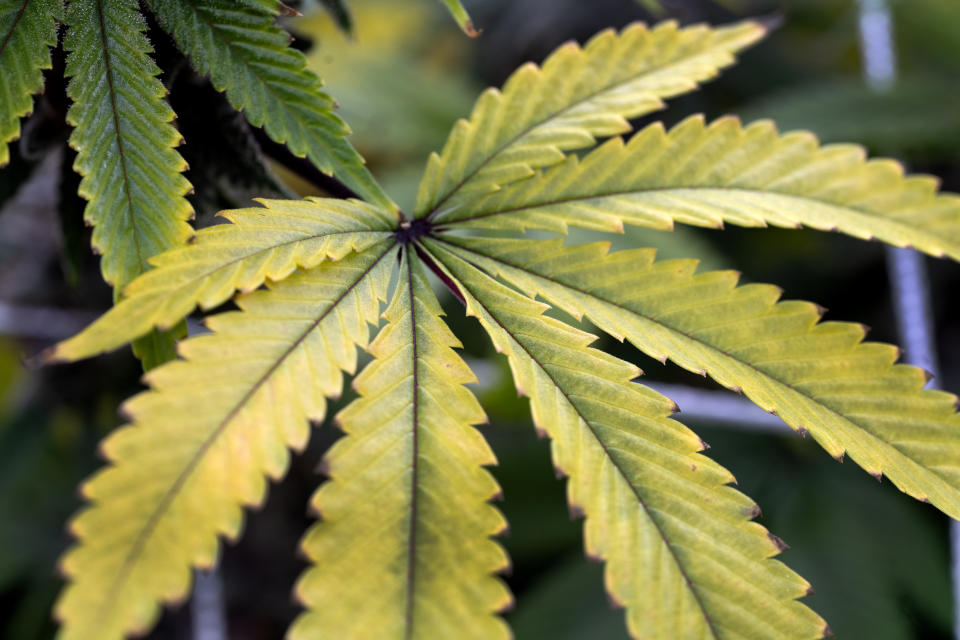Two researchers hope to use cannabis to 'temporarily close the doors' on coronavirus
Canadian researchers Olga and Igor Kovalchuk have been developing and testing novel cannabis strains for years, mostly to examine the strains’ efficacy to combat cancer and inflammation.
Now, they’ve turned their focus to COVID-19, after preclinical research showed their strains might make it more difficult for the virus to enter human cells.
As the pandemic began to unfold, and lockdown orders went into place, Olga Kovalchuk and her husband Igor wondered how their cannabis strains might interact with COVID-19. “Let's take a look whether or not any of our cannabis extracts affect any of the gene proteins that may be involved in COVID-19 disease,” Kovalchuk recalled asking.
The duo suspected their extracts might affect the ACE2 receptor, a gateway through which the virus enters and threatens human cells. “We looked through the literature and said ‘this looks very similar to SARS [Severe Acute Respiratory Syndrome], so it probably enters in a similar way,’” Kovalchuk said.
A scientific paper later confirmed their suspicions, which sent the two researchers combing through a mountain of data they had collected on their 1,500 cannabis strains.
They identified high CBD concentration extracts that showed to decrease the level of ACE2 gene expression, and ACE2 protein in artificial human cell models taken from the lining of the intestines, lungs, and mouth. Evidence of the decrease meant that the extracts could have been blocking the receptors through which COVID-19 enters.
“If you think about our body as a house with a hundred doors and this ACE2 receptor being a doorway for the virus, it attaches to it, the receptor kind of brings it in,” Kovalchuk explained. The method does not target the virus itself, she said, but rather the pathway it uses to enter the cell.
“When we found that extracts can modulate the levels [of ACE2 receptors] we thought this could be used for prevention,” she added. “If we temporarily close these doors then there will be less virus that enters over a period of time.”
‘This is what we are hoping for’

If the theory proves out, Kovalchuk envisions that cannabis strain extract could be manufactured into medical formulations for prevention and treatment. One such use could potentially block the virus from entering human cells in healthy individuals.
Another possibility is that it could prevent the virus from propagating, once it has already invaded a person’s system. Still, the preclinical hypothesis needs to undergo rigorous, randomized, controlled trials, Kovalchuk said.
“This is what we are very much hoping for,” she said, speaking about her goal to find funding for the trials, which can run into the tens of millions of dollars. A 2018 study conducted by Johns Hopkins and published in JAMA Internal Medicine found that new drugs approved by the FDA had clinical trials with a median cost of $19 million.
However, because cannabis has already been approved for medical use by health authorities around the world Kovalchuk sees an easier path to get trials off the ground. And, with government regulatory hurdles temporarily relaxed to spur innovative vaccines and treatments for the virus, Kovalchuk hopes that trials can get underway, quickly.
Ultimately, the Kovalchuks said if the extracts do show medicinal promise, they want it to be cost effective for everyone.
“We don't want this product to cost $600,” she said. “We want something that any average Canadian, any average American can use.”
Already, one of the duo’s high CBD strains that has potential to block cell receptors from permitting COVID-19 to enter can be found in a recreational tincture, currently sold through a Canadian dispensary. Though they stress that there is no legal connection between the research on the extract contained in their paper and the recreational strain.
They also stress that cannabis, unlike penicillin, cannot be regarded as generic, or a one size fits all, medical treatment. In the course of their research, they said, they have found some strains appear to cause harmful cell conditions to become more acute, while others show no response at all.
The husband and wife team is also conducting a separate study now undergoing peer review. In preliminary research, five of their cannabis strains appeared to improve a respiratory inflammatory response known as a “cytokine storm” that in some COVID-19 cases is so severe that it leads to complications causing death.
They propose that some of their cannabis lines suppress, or downgrade two key drivers of the cytokine storm.
Alexis Keenan is a reporter for Yahoo Finance. Follow on Twitter @alexiskweed.
[Click the following links for more of Yahoo Finance’s coronavirus coverage: Personal finance tips, news, policy, graphics & more from Yahoo Finance]
Follow Yahoo Finance on Twitter, Facebook, Instagram, Flipboard, LinkedIn, and reddit.
Find live stock market quotes and the latest business and finance news.


